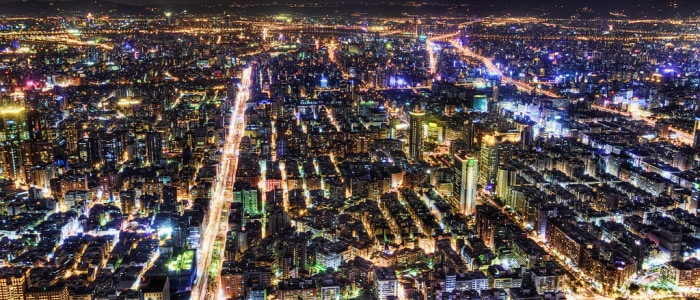Published
One Country, Two Internets: China and Hong Kong

Shenzhen, also known as China’s Silicon Valley, is located less than 30 km north of Hong Kong. As a leading ICT capital, Shenzhen’s economic growth is gradually catching up with Hong Kong – and this mainland city has already surpassed European countries like Slovenia, Portugal and Greece in GDP per capita.
The Shenzhen-Hongkong metropolitan area is divided by a clear line by the policy of “one country, two systems”. While the citizens in Shenzhen are well-informed of the crises in Ukraine and the Middle-East, they were initially oblivious about Occupy Central happening right next door. The public broadcaster CCTV was late to report from the student protests; while Twitter, Facebook and major foreign news websites have been blocked on Chinese mainland for decades. When the images from the umbrella revolution started to appear on Instagram (one of the few foreign social media allowed in China), it was immediately shut down by Chinese censors, but only on mainland China – Beijing knows too well that internet censorship in Hong Kong would only backfire.
Deng Xiaoping, the first post-Mao chairman, supposedly has said that the modernisation of China will take a hundred years divided into three equal instalments: the first period to secure the “territorial integrity” of the motherland (i.e. the civil war and the reunification of Hong Kong), the second to modernise its economy – and finally the third period of political reforms. The People’s Republic is turning 66 next year – or two-thirds of a century if you so wish – and is now weighing on the threshold to its last stage of reforms. Not even the most rabid China-basher would deny that China has gone a long way, and the Chinese people are now enjoying more freedoms than ever before.
Arguably, one of the most important of freedoms came with its market economy. Yes, it may be volatile, or perhaps a little corrupt, but nonetheless: Chinese market liberalisation created millions of jobs that made the Chinese dream possible and spawned the first-ever generation of Chinese who were able to accomplish their dreams without emigrating; it created the first-ever privately-owned Chinese multinationals – like Huawei, the global leader in telecom engineering, or the e-retailer Alibaba.com, who recently completed largest IPO in history raising $25 billion. It is not a coincidence that both are tech firms operating out of Shenzhen: China is now the world’s largest internet economy with 700 million users online, where more than half a billion people are active on blogs or online forums where the political debate is increasingly outspoken and candid.
For the central government in Beijing, the internet is an indispensable tool for economic growth, but also a valve to let off some steam from the pressure cooker we call Chinese modern life, with local mismanagement, smog, wide-spread corruption in schools and hospitals. In short, let malcontent crowd microblogs like Weibo (in any case limited to 140 characters) rather than on Tiananmen Square. In any event, there is a kill switch – the ubiquitous state censorship demands that all websites must apply for content provider licences that comes with editorial responsibilities and criminal sanctions that few Western publishers or e-commerce operators would accept. Furthermore, all web and email traffic in and out of the country is routed through checkpoints where censors can block or scan anything. Foreign search engines or apps that compete with Chinese services are sometimes blocked or slowed down to render them useless. This filter between China’s two systems caught Instagram and its thousands of images from Hong Kong Central.
Nonetheless, Beijing’s main concern in Hong Kong is neither photo-blogs nor the calls for democracy. The legendary Chinese top diplomat Qian Qichen, who negotiated the Hong Kong handover, fervently recalls in his autobiography how the British started to push for democratic reforms during the handover – after refusing political rights or citizenships to Hong Kong for a century – with the intent of handing over a ticking bomb to China. Qian’s point may seem banal, but still a valid point in 2014: Hong Kong has never been democratic. Occupy Central is first and foremost a protest against Beijing’s interference in Hong Kong’s internal affairs: Democracy just happens to be the best alternative to Beijing rule.
Contrary to what many outsiders believe, China is a relatively loose statehood and a frail federal construct – not dissimilar to the EU. China is on the verge of unravelling at every economic crisis and inflation spike; the tensions between Beijing and the provinces have been a constant throughout the history. The key states act as kingmakers and bargain over budgets and Politburo and State Council nominations – once again, not entirely dissimilar to the EU. Let it remain unsaid whether the current leadership of Xi actually share Deng’s view on the timing and the end of the third and final reforms but no Chinese leader – neither current or past – is willing to risk a return to the time before year Zero, the time before Mao, and the dissolution of the central state. This political instinct explains why Deng resorted to using force in 1989 (albeit reluctantly) – and why Instagram is blocked in 2014.
Beijing is about 2,000 km from Occupy Central – twice as far as Taipei, where the Chinese enjoy free speech and free elections. There are almost forty daily flights to Taipei compared to only twenty to Beijing from Hong Kong. The old cliché says globalisation and the internet have shortened the distances – but the rift between Hong Kong and Beijing is ever-increasing. Technology, more than anything else, made it possible for the two systems to co-exist in China for another 33 years, if deemed necessary.
A Swedish version of this text was printed as an op-ed in SvD on Oct 9th, 2014

